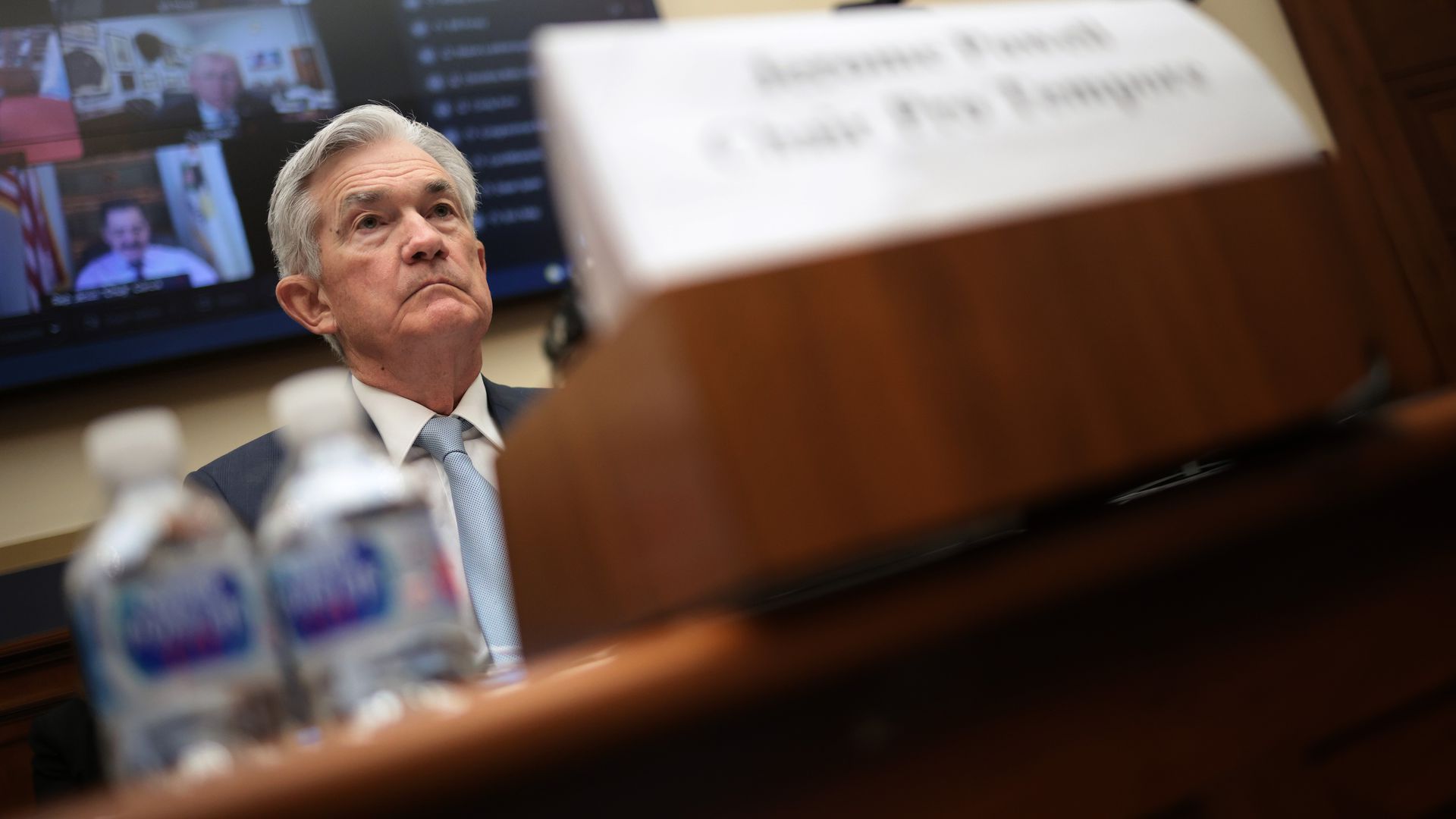| | | | | | | Presented By Emergent BioSolutions | | | | Axios Markets | | By Emily Peck and Matt Phillips ·Mar 03, 2022 | | Welp, it's Thursday. We're talking about the power of the almighty buck, war, women and the Fed. 📺 Tonight is markets night on streaming services. "The Problem with Jon Stewart" on Apple TV+ takes on the various issues embedded in the stock market, and a new HBO Max doc on the GameStop saga, "Gaming Wall Street," debuts. Today's newsletter is 1,066 words, 4 minutes. | | | | | | 1 big thing: Dollar is U.S.' ace in the hole |  | | | Illustration: Aïda Amer/Axios | | | | The sanctions that are now hammering Russia's currency, banks and economy are a vivid demonstration of the power of the U.S. dollar, Matt writes. Why it matters: It's a rare glimpse into the often invisible — but incredibly valuable — influence the greenback gives the U.S. - Starting Feb. 24, the U.S., the European Union and other allies imposed a range of particularly severe sanctions — from barring several Russian banks from using SWIFT to freezing the assets of the Russian central bank.
State of play: The ruble has dropped 30% in the last 10 days, hitting a new record low. Russians are lining up to withdraw cash from ATMs. - Russia's government itself might not be able to make payments on its dollar-denominated bonds, analysts say.
How it works: The sanctions pack a punch because they cut off Russia's unfettered access to the U.S. dollar, which a modern economy needs to function. - Russia relies on its central bank as well as its commercial banks to source the dollars it needs. Sanctions are intended to make that harder.
Yes, but: Some say cutting off Russia's access to dollars — or weaponizing the currency — could push countries like China and Russia to create a parallel system that avoids using the buck. What they're saying: "Never seen weaponization of money on this scale before…you only get to play the card once," Dylan Grice, a hedge fund manager based in the U.K., tweeted. "It's a turning point in monetary history: the end of USD hegemony." - Such ideas are having a moment. Bloomberg and the Financial Times both noted that the era of dollar dominance could be shortened by overzealous sanctions.
But don't hold your breath, says Abraham Newman, a Georgetown University political science professor who has studied how global financial systems can become a source of political power. - He says the dollar system isn't a top-down invention of world leaders. Rather, it developed organically over decades in which private investors, traders and businesses decided that they preferred to use greenbacks.
- That's because the dollar is a relatively stable, easily traded currency in a country with an accountable government and transparent legal system.
On the flip side: China's currency, the yuan — considered a potential rival to the dollar — has few of those advantages, largely because of the Chinese government's authoritarian nature. The bottom line: There's a long history of people looking for alternatives to the dollar. It still doesn't exist. That's a source of strength for the U.S. Go deeper. |     | | | | | | 2. Catch up quick | | 🇷🇺 Russia's credit rating cut to junk. (Reuters) 🏠 The U.K. plans Russian oligarch property seizures. (FT) ⚖️ U.S. Justice Department launched an oligarch task force. (NYT) 🛢 Oil prices spike to the highest level since 2008. (MarketWatch) 😷 COVID cases continue a steep decline over the last two weeks. (Axios) |     | | | | | | 3. Where Russia's money is |  Recreated from Atlantic Council GeoEconomics Center; Chart: Axios Visuals; Does not include gold held domestically. *This value also encompasses smaller financial institutions. The status of these reserves is unclear. Russia spent seven years building a financial "fortress" that could help it withstand the impact of sanctions imposed by the West — and the keystone was $630 billion in central bank foreign exchange reserves, Axios' Kate Marino writes. - Presumably, Russia didn't expect the G7 nations to go so far as to freeze those reserves — which they did this week — a move nearly unprecedented in scope.
Why it matters: That fortress isn't so strong after all if Russia can't use its billions to support its war efforts and fund domestic spending. - The G7 has locked up nearly $400 billion of that money, according to estimates by the Atlantic Council GeoEconomics Center.
Backstory: Since March 2014, Russia has cut its foreign assets held in the U.S. and Europe, while increasing those in China and Japan, as well as its domestic gold holdings, the FT reports. The big question: How China will handle Russia's yuan assets. China's not expected to freeze them — but faces a dilemma in how to aid its strategic partner, Russia, without running afoul of Western sanctions, Bloomberg writes. |     | | | | | | A message from Emergent BioSolutions | | We Go to protect against public health threats | | |  | | | | Emergent develops, manufactures and delivers protections against critical health threats — from fighting cholera and smallpox to counteracting opioid overdoses, and manufacturing vaccines and treatments that create a better, more secure world for us all. And that's why We Go. | | | | | | 4. 😬 U.S. ranks 38th on gender equality |  Data: 2022 SDG Gender Index; Note: The 2022 report is sourced from 2020 data. GDP per capita is based on purchasing power parity; Chart: Jacque Schrag/Axios The U.S. ranks 38th in the world on the newly released 2022 SDG Gender Index, which tracks the empowerment of women and girls across a variety of metrics — from health to education to workplace rights, Emily writes. - The report looks at pre-COVID data, and its authors warn that the picture for women and girls is even worse today.
The big picture: In a crisis, progress on gender equality tends to get rolled back — women and girls are often first to leave their jobs or schools to handle more caregiving responsibility, for example. - This index shows that the state of gender equality was fragile and lagging even before the crisis of COVID — and the pandemic forced women out of work, drove up maternal mortality rates and even led to a spike in child marriage rates in some countries.
- No country has achieved full gender parity, according to the report. Still, some made progress since 2015, when the index was first published.
Details: Equal Measures 2030 is a coalition of feminist advocacy groups, including the Gates Foundation, Plan International and other groups worldwide. The index looks at gender across a range of sustainability goals established by the United Nations. - The report found that wealthier nations tend to rank higher for gender equality, but the U.S. ranks closer to less-wealthy nations like South Korea and Costa Rica.
What to watch: March is women's history month, expect a raft of data and information on women's economic standing. |     | | |  | | | | If you like this newsletter, your friends may, too! Refer your friends and get free Axios swag when they sign up. | | | | | | | | 5. 🚀 Liftoff is a go for Fed |  | | | Fed chair Jerome Powell faces the Houes Financial Services Committee. Photo: Win McNamee/Getty Images | | | | Federal Reserve chair Jerome Powell yesterday offered an unusually specific description of the Fed's plans for its policy meeting later this month, Axios' Neil Irwin writes. What's new: Powell said at his semiannual Congressional testimony that he's inclined to proceed with a quarter-percentage-point interest rate increase in two weeks. Why it matters: For weeks, Fed officials have faced questions about whether they would begin their monetary tightening campaign with the customary quarter-point at a time rate increase, or move faster to try to choke off soaring inflation. - Powell has firmly put himself on the side of caution, particularly in light of the conflict in Europe.
"We will proceed, but we will proceed carefully as we learn more about the implications of the Ukraine war for the economy," Powell told the House Financial Services Committee. - "We will avoid adding uncertainty to what is already an extraordinarily challenging, uncertain environment."
The bottom line: Powell is betting that steady-as-she-goes is the best stance for the central bank during this uncertain time. Go deeper. |     | | | | | | A message from Emergent BioSolutions | | We Go to protect against public health threats | | |  | | | | Emergent develops, manufactures and delivers protections against critical health threats — from fighting cholera and smallpox to counteracting opioid overdoses, and manufacturing vaccines and treatments that create a better, more secure world for us all. And that's why We Go. | | |  | Bring the strength of Smart Brevity® to your team — more effective communications, powered by Axios HQ. | | | | | | Axios thanks our partners for supporting our newsletters. If you're interested in advertising, learn more here.
Sponsorship has no influence on editorial content. Axios, 3100 Clarendon Blvd, Suite 1300, Arlington VA 22201 | | | You received this email because you signed up for newsletters from Axios.
Change your preferences or unsubscribe here. | | | Was this email forwarded to you?
Sign up now to get Axios in your inbox. | | | | Follow Axios on social media:    | | | | | |











No comments:
Post a Comment